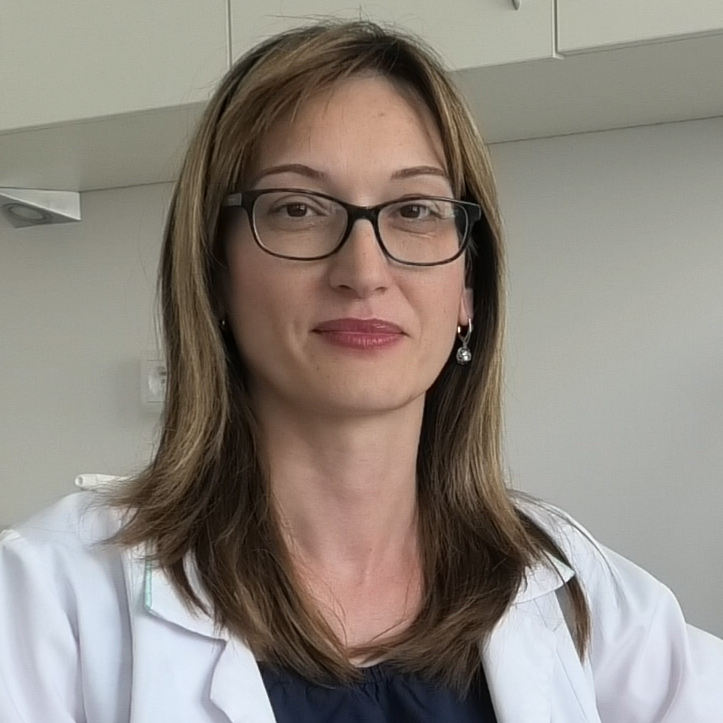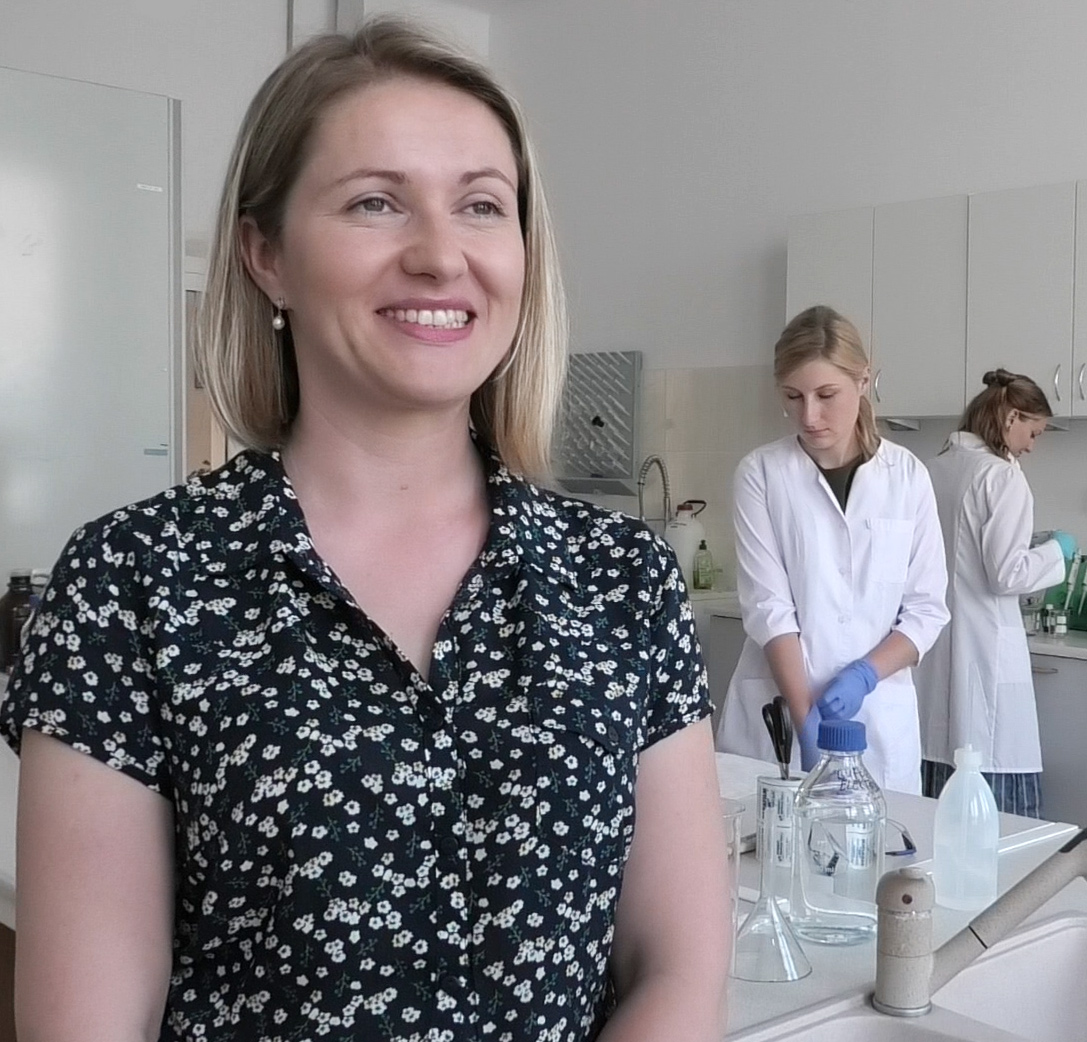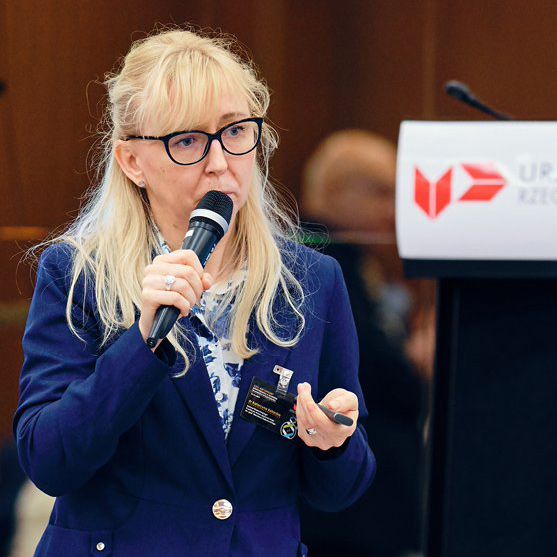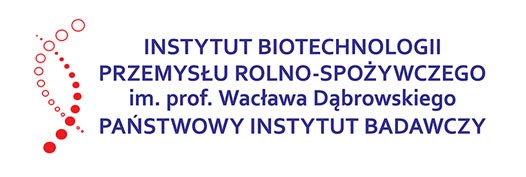Prof. Wacław Dąbrowski Institute of Agriculture and Food Biotechnology conducts basic and applied research in the field of food&feed safety and quality.
With more than 100 years of experience permanently enriched with the newest developments in molecular biology, environmental genomics to support food quality and healthy nutrition.
A strong team of more than 200 employees, including three titular professors, nine associate professors and 33 PhD researchers contribute its insights, expertise and experience in microbiology including metagenomics of the food chain, animal and human health, biotechnologies and environmental bio-refineries, cell and process engineering, biochemistry, food technology, human nutrition and dietetics.
The Institute’s fields of activity also include many sectors of the agri-food industry i.e food processing, storage technologies development, food production.
Keywords: food safety, food analysis, food quality, biodiversity, functional food, food concentrates, renewable energy sources, starch products, fermentation technology, meat and fat industry, fruits, vegetables, cereal processing, bakery, distillers, refrigeration, sugar industry, microbiology, dairy industry, collection of cultures, metagenomics.

Krystian Marszałek, Ph.D. Associate Professor
Institute of Agricultural and Food Biotechnology (IBPRS)
Department of Fruit and Vegetable Product Technology
krystian.marszalek@ibprs.pl
T (+48) 695 090 885
RUR-06-2020
Innovative agri-food chains & RUR-07-2020 Reducing food losses along the value chain
Project proposal objectives:
- Application of emerging techniques (high pressure processing, high pressure carbon dioxide, high pressure homogenization, microwave heating system, pulsed electric fields, ultrasounds) for fruit and vegetable product preservation/ processing
- Bioavailability and bioaccessibility of bioactive compounds from fruit and vegetable matrices,
- Different extraction techniques applications, including green extraction with supercritical carbon dioxide for obtaining high nutritional bioactive compounds
- Functional foods
1. Existing partnership:
– Spain: University of Valencia (Francisco J. Barba), University of Seville (Antonio J. Meléndez Martinez), IATA CSIC Institut d’Agrogumica I Tecnologia dels Aliments (Marie Carmen Collado), Fundación Centro Technolóxico da Carne (Jose M. Lorenzo)
– Portugal: University of Aveiro (Jorge A. Saraiva)
– Italy: University of Padua (Sara Spilimbergo)
– China: Wuhan Polytechnic University (Zhenzhou Zhu), Institute of Food Science and Technology (Jinfeng Bi)
2. Requirements for additional partner(s):
– Complementary scientific areas
– Expertise in Food safety
– Impact of nutrition on health research
– The ability to be a consortium leader
3. IBPRS expertise:
– Application of high pressure processing, high pressure carbon dioxide and high pressure homogenization for fruit and vegetable products preservation
– Physicochemical analysis: pH, Brix, acidity, color changes, viscosity, density, particle size distribution, minerals
– HPLC analysis of: anthocyanins, polyphenols, carotenoids, betalains
– Oxidoreductive (polyphenol oxidases, peroxidases) and hydrolytic (pectin esterases, polygalacturonases) enzymes activity
– Antioxidant capacity (ABTS, DPPH)

Renata Choińska, Ph.D., Eng
Institute of Agricultural and Food Biotechnology (IBPRS)
Department of Fermentation Technology
renata.choinska@ibprs.pl
T: (+48) 633 637 340
BBI-2019-SO2-R3
Microorganisms and/or enzymes application in resolving plastics end-of life issues (RIA)
Project proposal objectives:
-
Broadening the knowledge about microbial gene involved in the polymer degradation
-
Metagenomics sequencing of biofilms fouling polymer wastes disposed in soil (community composition analysis)
-
Testing (verification) of different microbes suitable co-culture to enhance biodegradation
-
Biodegradation conditions optimization (temperature, pH, moisture content) during soil burial tests
-
Biodegradability degree analysis by means of different analytical techniques
-
Ready-to-use preparations development
1. Existing partnership:
Leibinz Institute of Polymer Research Dresden, Germany
2. Requirements for additional partner(s):
– Metagenomics sequencing
– Biodegradation in compost and soil burial test
3. IBPRS expertise:
– Isolation, identification, characteristics and collection of microorganisms from plant and animal sources, organic raw materials, natural fermented food, i.a. with potential for biological control and bio conservation
– Lactic acid bacteria exploitation as starter cultures to improve the preservation, nutritional value and sensorial characteristics of a variety of fermented foods and products derived from vegetable origins.
– Research of antagonistic (antifungal activity) of yeast for use as a biocontrol agents in the preservation of fruits, vegetables, and crops.
– Analysis of microbial primary and secondary metabolites having desired biological activities
– Investigating the competition, cooperation, domination of LAB in the microbiota of fermented products.
– Starter cultures development based on selected lactic acid bacteria strains for renewable raw materials ensiling (maize and grasses)
for biogas production with improved efficiency and purity.
– Microbial community investigation for the biological degradation of biodegradable and currently non-biodegradable plastics

Marta Kupryś-Caruk, Ph.D.
Institute of Agricultural and Food Biotechnology (IBPRS)
Department of Fermentation Technology
marta.kuprys@ibprs.pl
T: (+48) 502 032 812

Katarzyna Kotarska, EngD
Institute of Agricultural and Food Biotechnology (IBPRS)
Department of Distillation Technology and Renewable Energy Sources (ZG)
katarzyna.kotarska@ibprs.pl
T: (+48) 52 341 00 82
CE-SFS-39-2019
High-quality organic fertilisers from biogas digestate
Project proposal objectives:
-
Research on the impact of digestate on groundwater contamination or residues in soil
-
Research on the impact of digestate on yield and nutritional values of plant crops
-
Research on the impact of AD process parameters on the quality of obtained digestate
-
Research on the impact of digestate used as fertilizer on microbiome of soil
-
Study on the possibility of digestate enrichment with valuable substances of various origins
-
Digestate quality assessment in terms of compliance with soil protection legislation, fertilizer or waste legislation or combinations thereof
-
Study and description on the new bio-fertilizers based on methane fermentation wastes.
1. Existing partnership:
– Warsaw University of Life Sciences (SGGW), Poland
2. Requirements for additional partner(s):
– Metagenomics sequencing
– Expertise on the field of methane fermentation (industrial microbiology)
3. IBPRS expertise:
– Digestate quality examination by determination of features related to the digestate’s properties, such as: content of nutrients, pH value, content of dry matter and organic dry matter, homogeneity, features related to health and safety including physical and biological purity, content of chemical pollutants, both organic and inorganic
– Determination of technological usefulness of digestate related to its sorption and rheological properties
– Field tests related to the impact of digestate on crop yield
– Comprehensive study of the chemical composition of biomass intended for anaerobic digestion
BBI-2019-SO2-F2
Apply technological combinations to valorise all components of biomass feedstock
Project proposal objectives:
-
Bio-waste usage (organic waste biomass) from various branches the agri-food industry
1. Existing partnership:
– University of Warmia and Mazury in Olsztyn
2. Requirements for additional partner(s):
– Expertise on the field of alternative methods degradation of lignocellulosic biomass
3. IBPRS expertise:
– Research related to the degradation of lignocellulosic biomass, combining physical pretreatment methods (comminution, steam explosion, and thermal hydrolysis) to overcome its recalcitrance,
– Enzymatic recovery of sugars and technologies for the valorization of the byproducts released in the process,
– In the field of renewable energy sources, with particular emphasis on environmental protection during biofuel production and biowaste management,
– Studies of way to management biological waste,
– Using biomass and waste to biofuel production,
– Alternative fuels development through the use of sustainable biomass waste resources.
Marcin Bryła, Ph.D. prof. IBPRS
Institute of Agricultural and Food Biotechnology (IBPRS)
Department of Food Analysis
marcin.bryla@ibprs.pl
T: (+48) 503 732 460
SFS-04b-2020
Integrated health approaches and alternatives to pesticide use – Biocidal and plant protection products
Project proposal objectives:
-
Expanding knowledge about the possibilities of using microorganisms in cereal protection against pathogenic fungi infections
-
Isolation and genotypic characteristics of prospective fungi (eg from the genus Trichoderma).
-
Antifungal activity evaluation of isolates against pathogenic Fusarium strains.
-
Ability assessment of protective strains to metabolize selected chemical and environmental pollutants (pesticides, mycotoxins)
-
Toxicological profile evaluation of analogs and their metabolites produced by fungi included in the cereal crop protective preparation.
-
Preparation and application in the cultivation of cereal plants
1. Existing partnership:
National Institute of Health Sciences in Tokio, Japan; Institute of Plant Genetics in Poznań, Poland; University of Life Sciences in Poznań, Poland, Institute of Soil Science and Plant Cultivation – State Research Institute in Puławy, Poland; -Breeding and Acclimatization Institute, National Research Institute (IHAR), Poland
2. Requirements for additional partner(s):
– Access to mushroom species for the protection of cereals against pathogenic fungi of the genus Fusarium
– Chemical and/or biochemical synthesis of mycotoxins and pesticides derivatives obtained by the metabolism of fungi included in the preparation
– Toxicological evaluation of tested potential pollutant metabolites
3. IBPRS expertise:
– Antifungal activity characteristics of protective isolates against fungi of the genus Fusarium
– Ability assessment of protective fungi strains to degrade selected food contaminants
– Mycotoxins and pesticides metabolites analysis
Izabela Porębska, EngD
Institute of Agricultural and Food Biotechnology (IBPRS)
Department of Microbiology
izabela.porebska@ibprs.pl
T: (+48) 22 606 39 25
BBI-2019-SO2-R6
Improve biorefinery operations through process intensification and new end products
Project proposal objectives:
-
Broadening the knowledge about microbial study the germination and inactivation processes
-
Development of non-thermal and application techniques of food preservation
-
Answers to the question: how the use of alternative methods of preservation impacts on food quality and safety
1. Existing partnership:
INRA, France
2. Requirements for additional partner(s):
– Expertise on the impact of alternative methods on food in terms of nutritional quality
– Expertise in alternative methods food preservation, changes eg at the molecular level occurring in cells, including bacteria, after using
3. IBPRS expertise:
– Research on physical stress related to the use of innovative, non-thermal and application techniques of food preservation, including high hydrostatic pressure and supercritical carbon dioxide and the availability of biochemical substances, initiate and influence the course of germination and inactivation of the spores of Alicyclobacillus acidoterrestris
– Studies on the effectiveness of new, alternative methods of food preservation, among others high hydrostatic pressures combined with ultrasound to study the germination and inactivation of Alicyclobacillus acidoterrestris in food during its storage after preservation
– Study of the biodiversity of microorganisms important in the food industry using molecular methods
– Studies on the occurrence and interaction of microorganisms in the environment and at particular stages of the production process
– Testing the quality and microbiological safety of raw materials, semi-finished products and food products
Anna Szosland-Fałtyn, EngD
Institute of Agricultural and Food Biotechnology (IBPRS)
Department of Food Quality
anna.szosland@ibprs.pl
T: (+48) 690 966 636
Beata Bartodziejska, Ph.D.
Institute of Agricultural and Food Biotechnology (IBPRS)
Department of Food Quality
beata.bartodziejska@ibprs.pl
T: (+48) 690 966 636
SFS-40-2020
Healthy soils for healthy food production. KET – Biotechnology: China, environmental pollution,
bioremediation, efficient and low cost, field trials, IA
Project proposal objectives:
-
Innovation of natural Fertilizer and Pesticides Technology
1. Existing partnership:
– Division of Gastro immunology, Department of Immunology and Infectious Biology, Institute of Microbiology, Biotechnology and Immunology, Faculty of Biology and Environmental Protection, University of Lodz, Poland.
2. Requirements for additional partner(s):
– Practical tests on Chinese fields concerning the effectiveness of herbicide in fertilization, re-cultivation and weed control.
3. IBPRS expertise:
– Experience in conducting fermentation processes in semi-technical scale,
– Isolation, identification, characteristics, and collection of microorganisms from fruit materials during fermentation,
– Raw materials selection for fermentation,
– Development of technological parameters of fermentation,
– Evaluation of the microbial community during fermentation,
– Herbicide quality parameters investigation,
– Investigation of natural herbicide force and its effectiveness in soil re-cultivation.

Rafał K. Wóycicki PhD, Eng.
Institute of Agricultural and Food Biotechnology (IBPRS)
Interdepartmental Group of Food Metagenomics
Department of Microbiology
rafal.woycicki@ibprs.pl
T: (+48) 605 155 610
SFS-02-2020
Healthy livestock gut ecosystem for sustainable production
The project proposal objectives:
– Deciphering how different farming conditions and different milk cows breeds influence gut microbiota functioning
– Correlate microbiome content and activity with animal health, milk quality and milk production efficiency
– Creating schemes for dairy farming conditions to achieve secure and sustainable milk production
Requirements for additional partner(s):
– Dairy farms professionals (ecological and standard)
– Veterinary doctors
– Milk production industry professionals
Expertise of Interdepartmental Group of Food Metagenomics:
– DNA sequencing, analysis and assembly (de-novo and remapping), meta-genomics
– RNA expression profiling, transcriptome assembly, meta-transcriptomics
– Bioinformatics
– Isolation, identification, characteristics, collection of microorganisms from different sources
– Dairy production technology
Rafał K. Wóycicki PhD, Eng.
Institute of Agricultural and Food Biotechnology (IBPRS)
Interdepartmental Group of Food Metagenomics
Department of Microbiology
rafal.woycicki@ibprs.pl
T: (+48) 605 155 610
SFS-21A-2020
Emerging challenges for soil management – soil biodiversity assessment
The project proposal objectives:
– Asses the microorganisms biodiversity of the soils in different geographical and ecological localizations, including wild and plant & animal food production areas of ecological and standard production type
– Correlate soil microorganisms biodiversity with the land degradation, soils pollution, quality and safety of food produced, and wellbeing of people
– Create schemas of future soils maintaining, agricultural and farming practices that will slower the biodegradation of soils by making it again an ecological niche for microorganism and therefore secure the sustainable food production for the future generations
Requirements for additional partner(s):
– Plant agricultural farming specialists
– Specialists in environmental safety
– Plant food farming professionals
Expertise of Interdepartmental Group of Food Metagenomics:
– DNA sequencing, analysis and assembly (de-novo and remapping), meta-genomics
– RNA expression profiling, transcriptome assembly, meta-transcriptomics
– Bioinformatics
– Isolation, identification, characteristics, collection of microorganisms from different sources
Rafał K. Wóycicki PhD, Eng.
Institute of Agricultural and Food Biotechnology (IBPRS)
Interdepartmental Group of Food Metagenomics
Department of Microbiology
rafal.woycicki@ibprs.pl
T: (+48) 605 155 610
SFS-13-2020
Genome and epigenome enabled breeding in terrestrial livestock
The project proposal objectives:
– Deciphering the phenomena of epigenetic environmental modifications of milk production phenotypes
– Bring new methodologies and quick & reliable solutions for environmental modifications’ wise selection of livestock for breeders and farmers
– Allowing better conservation of genetic diversity and sustainability of livestock production by taking into consideration environmental and ecological variability
Requirements for additional partner(s):
– Dairy cows breeding experience
– Dairy farming industry (ecological & standard)
– Dairy production industry (ecological & standard)
Expertise of Interdepartmental Group of Food Metagenomics:
– Phenotypic and molecular markers linkage analysis
– DNA sequencing, analysis and assembly (de-novo and remapping)
– RNA expression profiling
– Transcriptome assembly
– Epigenetic marks profiling
– Functional annotation of genes
– Comparative genomics including functional and structural variability
– Correlating information from genome assembly, gene expression and epigenetic marks profiling with the phenotype to use as a potential molecular indicators
– Bioinformatics
Rafał K. Wóycicki PhD, Eng.
Institute of Agricultural and Food Biotechnology (IBPRS)
Interdepartmental Group of Food Metagenomics
Department of Microbiology
rafal.woycicki@ibprs.pl
T: (+48) 605 155 610
Bio-based technologies, biorefineries, microbial communities, microbiomes, industrial environments, big data, RIA
The project proposal objectives:
– Enable industrial scale microbiomes’ use for production of natural ecosystem and environment specific bio-nutrients, for both plant and animal food production
– Stopping soil degradation
– Environment and ecosystem specific soil revitalization
– Sustainable production of healthy, ecosystem and environment specific food and feed
– Farm animals’ well-being and health
Requirements for additional partner(s):
– Plant farming industry (ecological & standard)
– Animal farming industry (ecological & standard)
– Metabolites detection experts
– Chemical pollution detection experts
– Environment (soil) revitalization detection professionals
– Human diet experts
Expertise of Interdepartmental Group of Food Metagenomics:
– Isolation, identification, characteristics, collection of microorganisms from different sources
– DNA sequencing, analysis and whole genome assembly, meta-genomics
– Transcriptome assembly, RNA expression profiling, meta-transcriptomics
– Epigenetic marks profiling, meta-epigenomics
– Functional annotation of genes
– Bioinformatics
Rafał K. Wóycicki PhD, Eng.
Institute of Agricultural and Food Biotechnology (IBPRS)
Interdepartmental Group of Food Metagenomics
Department of Microbiology
rafal.woycicki@ibprs.pl
T: (+48) 605 155 610
KET Biotechnology – Omics, genotype-phenotype associations, genotype-environment interactions, data integration, big data, industry applicability, case studies.
The project proposal objectives:
– Helping in basic science studies about differential treatment/stress response in model and non-model organisms (genome, transcriptome assembly, gene expression and epigenetic marks profiling, gene annotation, other bioinformatic analysis)
– Deciphering variability of environmental influence on genomes and organismal phenotypes
– Broadening knowledge of environmental microorganisms, their functions and ecosystem variability of microbiomes activity
– Deciphering variability and interactions of microbiomes in food production chains
– Improving well-being of humans by creating solutions of environmental and ecosystem specific food & feed and food supplements production
– Improving selection processes in plant and animal breeding
Requirements for additional partner(s):
– Biorefineries professionals
– Food chain professionals
– Breeding professionals
– Farming professionals
– Human diet professionals
Expertise of Interdepartmental Group of Food Metagenomics:
– Phenotypic and molecular markers linkage analysis
– DNA sequencing, analysis and assembly (de-novo and remapping), meta-genomics
– RNA expression profiling, transcriptome assembly, meta-transcriptomics
– Epigenetic marks profiling, meta-epigenomics
– Comparative genomics including functional and structural variability
– Correlating information from genome assembly, gene expression and epigenetic marks profiling with the phenotype to use as a potential molecular indicators
– Bioinformatics
– Isolation, identification, characteristics, collection of microorganisms from different sources

